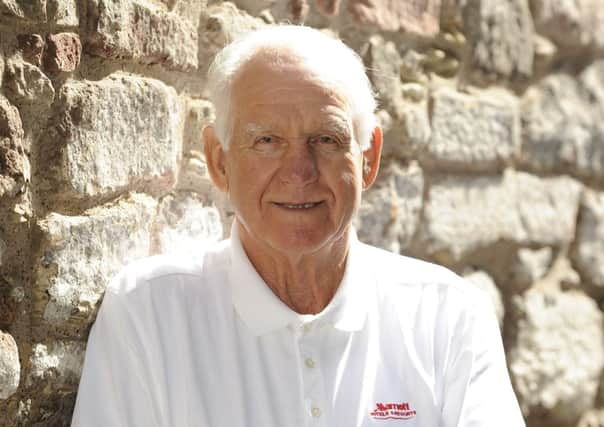Obituary: Rolando Ugolini, former Celtic and Middlesbrough goalkeeper


ROLANDO Ugolini was six months old when he and his mother arrived in Bathgate, West Lothian, at Christmas 1924 to join the rest of the family, who had immigrated from Italy and opened a fish and chip shop in nearby Armadale. That baby would become as Scottish as it gets, spending four years as a goalie at Celtic FC. But he became best-known south of the Border for his ten years in goal for Middlesbrough during their 1940s and 50s heyday at the old Ayresome Park. To Boro fans, the man they knew variously as Ugo, Roland, Lando or The Cat, was a legend, one of their greatest-ever and most-popular players.
After nearly a decade and 335 games for Middlesbrough, mostly in the English top flight (the old First Division) playing behind Wilf Mannion, England captain George Hardwick and later the young Brian Clough, he went on to a three-year spell at Wrexham (83 appearances) before returning to Scotland for Dundee United for two years and 43 games. Pushing 40, he had a one-match finale for Berwick Rangers in 1963 before hanging up his boots. He went on to a successful career in the betting industry, owning three betting shops.
Advertisement
Hide AdAdvertisement
Hide AdRolando Archimedes Giovanni Ugolini was born in the town of Lucca, near Pisa in Tuscany, to Giacondo Ugolini, from Chifenti in Lucca province and his wife Rosa. Giacondo and Rosa had already settled in the Armadale area with their son Romeo, but Rosa went back to Lucca to give birth and returned to Scotland with Rolando as soon as he had been christened.
After the First World War, in which Ugolini’s father had fought in the Italian army, his parents emigrated to Scotland on the advice of an old army comrade, who had moved to Edinburgh. The opened the popular Ugolini’s Fish & Chip shop at 12 East Main Street, Armadale. Many voted it the best chip shop in Scotland.
Ugolini went to St Anthony’s school in Armadale, leaving at 14 to work in the chippie. “I had already been gutting and filleting fish since I was 13,” he recalled.
He was 15 when the Second World War broke out. But with Italy lining up alongside Hitler, it was a difficult time for Italian-Scots. Ugolini’s father was interned on the Isle of Man for a year as “an enemy alien”. Ugolini and his mother were “relocated” to a camp in Cambuslang, Glasgow, where, too young to fight, he was ordered to do “war service” at home. Among his service was delivering coal and helping built flats at Pilton, Edinburgh. At the same time, his brother Romeo served in the British Army, initially in the Black Watch. One brother fighting the enemy, the other considered the potential enemy. Ugolini laughed it off in later years and was always grateful to the people of Scotland for treating him as one of them. His daughter-in-law, Dr Wendy Ugolini, of the University of Edinburgh, wrote a book about those days, entitled: Experiencing the War as the ‘Enemy Other’: Italian Scottish Experience in World War II.
Ugolini was signed up by Armadale Thistle (“The Dale”), who had dropped from senior to junior status a few years earlier. He helped them win a major junior championship in his first year. That attracted the attention of Scottish First Division scouts and he was chased by Rangers, Hearts, Airdrie, Motherwell and Falkirk. His trial at Tynecastle went well, but the club didn’t get back to him quickly and one day young Rolando came home from a junior match to see his father, “beaming all over his face”. talking to a stranger.
“Now, son, don’t excited,” his father said. “Do you know who this gentleman is?” It was Jimmy McStay, the manager of Celtic. Ugolini recalled: “I signed for the club of my dreams. I was chuffed to bits.”
However, although the post-war Celtic team was relatively weak, goalie Willie Miller, a regular Scottish international, was not. While widely respected for his acrobatics on the field and sense of humour off it, Ugolini played only five first team games in almost four years at Celtic Park, usually while Miller was injured or playing for Scotland.
He reluctantly asked the new manager, Jimmy McGrory, for a transfer. He turned down Chelsea and Middlesbrough snapped him up for £7,000 – a major fee in 1948. “The fact that Middlesbrough was nearer to Scotland played a big role,” he later said. Ugolini won the hearts of the Middlesbrough fans with his athleticism, acrobatics and showmanship.
Advertisement
Hide AdAdvertisement
Hide AdUgolini often recalled that the best players he guarded goal against were the Blackpool and England legend (Sir) Stanley Matthews and the Welsh “Gentle Giant” John Charles, one of the first British players to make his mark in Italy, with Juventus. “He used to sing,” Ugolini recalled, “and he was as good a singer as he was footballer, so it was great fun. Those were the days.”
In retirement, Ugolini spent much of his time playing golf, mainly at his old club at Dalmahoy (now the Marriott Golf & Country Club), where he played until his 80s and was often official starter on the first tee. There in Dalmahoy, or among older Celtic supporters in Glasgow, perhaps most of all in Middlesbrough, and back in his native town of Lucca, he was widely respected as a gentleman, within or without the game he loved – football.
Rolando Ugolini is survived by his wife of 25 years Irene and sons Rolando and Paul from his first marriage to Esther (née Gofton), whom he married in 1957 and who died in 2010. A third son, Dino, from the same marriage, predeceased him.